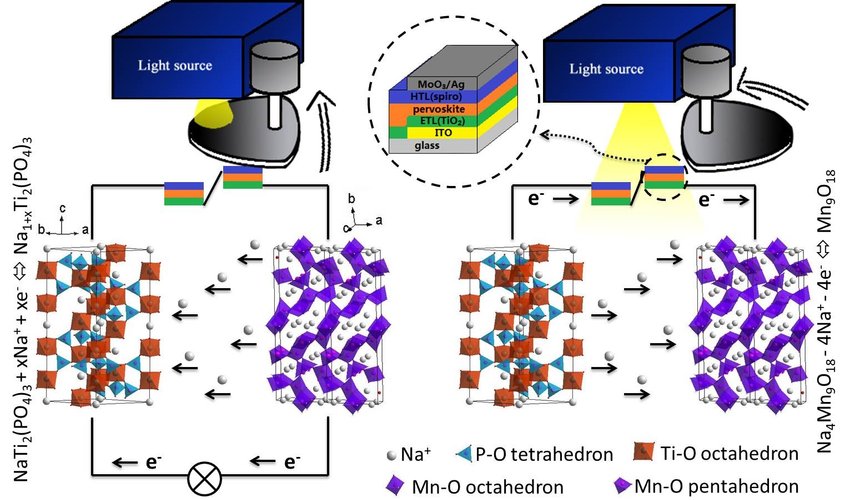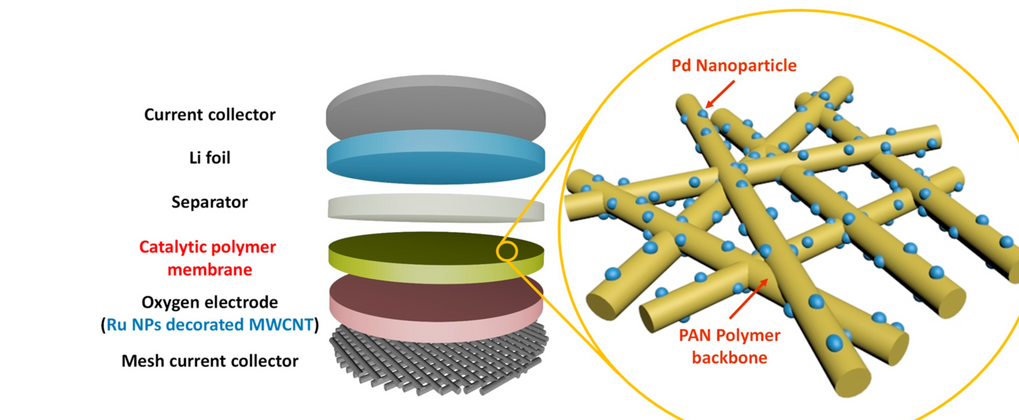Above- Schematic Illustration of the highly efficient perovskite photovoltaic-aqueous Li/Na-ion battery system developed by TMDLab.
Energy Storage
Lithium-ion technology represents the current state-of-the-art in rechargeable batteries. Its high energy and power density compared to older systems like Pb-acid, Ni-Cd, or Ni-MH makes it particularly valuable for applications in portable devices and transportation. While Li-ion cells using standard materials such as lithium cobalt oxide for the cathode and graphite for the anode have been widely commercialized, improvements to energy densities, cycle life, and safety are necessary to enable further applications (i.e. electric vehicles, microscale devices). Generating new cathode and anode materials and improving their performance characteristics are central to advancing lithium battery technology.
Our team is currently studying the synthesis and detailed characterization of next-generation lithium battery materials and systems. We have developed novel methods for thin film deposition (including the versatile layer-by-layer technique) for application in ultrathin rechargeable cells and have undertaken fundamental investigations of catalyst and electrolyte function in Li-O2/Li-air batteries.
Above- Heterogeneous tungsten sulfide/oxide core−shell nanofiber materials with vertically and randomly aligned thorn-bush features.Electrode materials with hierarchical architectures promise considerable improvement in future energy storage devices.
Related Publications:
Pt And Pd Catalyzed Oxidation Of Li2O2 And DMSO During Li–O2 Battery Charging. Gittleson, F. S.; Ryu, W. - H.; Schwab, M.; Tong, X.; Taylor, A. D. Chem. Commun., 2016, 52, 6605.
A New Design Strategy For Observing Lithium Oxide Growth-Evolution Interactions Using Geometric Catalyst Positioning. Ryu, W. - H.; Gittleson, F. S.; Li, J.; Tong, X.; Taylor, A. Nano Letters, 2016, 16, 4799.
Heme Biomolecule As Redox Mediator And Oxygen Shuttle For Efficient Charging Of Lithium-Oxygen Batteries. Ryu, W. - H.; Gittleson, F. S.; Thomsen, J. M.; Li, J.; Schwab, M. J.; Brudvig, G. W.; Taylor, A. D. Nature Communications, 2016, 7, 12925.
A Mesoporous Catalytic Membrane Architecture for Lithium-Oxygen Battery Systems, Won-Hee Ryu, Forrest S Gittleson, Mark Schwab, Tenghooi Goh, and Andre D. Taylor. Nano Letters, 2015, 15, 434.
Operando Observation of the Gold-Electrolyte Interface in Li-O2 Batteries, Forrest S. Gittleson, Won-Hee Ryu, André D. Taylor. ACS Applied Materials & Interfaces, 2014, 6, 19017–19025.
Catalyst and Electrolyte Synergy in Li-O2 Batteries. Forrest S Gittleson, Ryan C Sekol, Gustavo Doubek, Marcelo Linardi and André Taylor. Physical Chemistry Chemical Physics, 2014, 16, 3230-3237.
Polymer Coating of Vanadium Oxide Nanowires to Improve Cathodic Capacity in Lithium Batteries. Forrest S. Gittleson, Jonathan Hwang, Ryan C. Sekol, André D. Taylor. Journal of Materials Chemistry A, 2013, 1, 7979.
Improving the Assembly Speed, Quality, and Tunability of Thin Conductive Multilayers Forrest S. Gittleson, David J. Kohn, Xiaokai Li, and André D. Taylor, 2012, ACS Nano, 6, 3703.
Scalable Fabrication of Multifunctional Freestanding Carbon Nanotube/Polymer Composite Thin Films for Energy Conversion Xiaokai Li, Forrest Gittleson, Marcelo Carmo, Ryan C. Sekol, and André D. Taylor, 2012, ACS Nano, 6, 1347.


